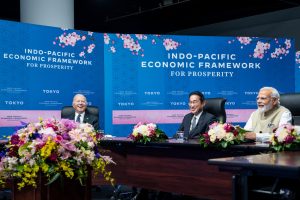Many in Taiwan certainly felt disappointed that as the United States revealed the initial countries to participate in the Indo-Pacific Economic Framework (IPEF), Taiwan was not among them. This unwelcome news will trigger a new wave of criticisms and doubts about U.S. policy toward Taiwan, with some hoping to pull Taipei back from its existing policy of over-reliance on the United States. However, it is wrong to construe the exclusion of Taiwan from IPEF as a rift in U.S.-Taiwan relations.
In reality, the major hurdle for Taiwan to join this multilateral framework comes down to the perennial issue of what name to use. Taiwan is currently a member of the WTO under the name of “The Separate Customs Territory of Taiwan, Penghu, Kinmen and Matsu.” For the U.S., allowing Taiwan to join the IPEF framework under the same name runs the risk of providing legitimacy to arrangements that degrade or belittle Taiwan’s sovereignty. The name of “Taiwan” is a non-starter, too, as it would challenge the current U.S. One China policy.
The U.S. is also hedging against potential blowback from Beijing, as most Indo-Pacific nations are still trying to avoid “picking sides” in the competition. For many of China’s neighbors, especially countries in Southeast Asia, it is imperative to maintain access to China’s market. Seven of the 10 ASEAN members joined IPEF’s launch; they may have thought twice if the event turned into a statement on Taiwan’s international status. Thus, including Taiwan in the first round of countries participating in IPEF could have embroiled the U.S. in a controversy over Taiwan’s representation, and the U.S. would not want the focus of the framework to be overshadowed.
However, this does not mean that the United States will definitely reject Taiwan’s participation in the future. The U.S. is proposing changing the name of Taiwan’s de facto embassy in the U.S., currently known as the “Taipei Economic and Cultural Representative Office in the United States,” to simply “Taiwan Representative Office.” If seen through, such a change could be used as a precedent for Taiwan to join IPEF or other similar multilateral mechanisms.
IPEF will serve two main strategic goals for the United States. First, the framework will develop norms and regulations for the digital economy and intellectual property theft. The core of IPEF is thus more ideological than economic. As opposed to existing trade deals that China often engages in with little to no strings attached, IPEF is an attempt to rally like-minded partners, based on shared values, to establish rules and norms that advance mutual interests. To put it simply, IPEF is a consortium of friends instead of a relationship just for business partners.
IPEF is thus an ambitious effort to overhaul the existing situation with China’s Belt and the Road Initiative in mind. In practice, IPEF will enable the U.S. to reconstruct a new hub-and-spoke system with the U.S. as the central command. Washington can then assign countries different roles based on their individual advantage and relations to the United States.
For the past two decades, the U.S. has taken a back seat and allowed China to take advantage of the liberal economic system at its expense. One of the most worrying results is that China has controlled the manufacturing of most products worldwide, allowing the country an oversized power to dictate and reshape global supply chains. Attracting like-minded partners in the Indo-Pacific region will ensure that no country can monopolize supply chains critical for U.S. national interests.
It is sensible that the U.S. would not want the repercussions of Taiwan’s participation to mask the goals of IPEF. However, it is incorrect to assume that we will witness a rift in Taiwan-U.S. relations because of this. The U.S. and Taiwan share numerous commonalities, especially in facing the threat of China. The current Biden administration has been no less supportive of Taiwan than the previous Trump administration. For instance, in 2021, Taiwanese firms received $200.1 billion in U.S. export orders, an increase of close to 50 percent from just a few years ago. The U.S. is also keenly aware of the important role that Taiwan Semiconductor Manufacturing Corporation (TSMC) plays in helping the U.S. stand out in technological competition with China. The firm provides more than 90 percent of global advanced semiconductor production.
In terms of Taiwan’s security, the ongoing war in Ukraine only makes the U.S. more heavy-handed and adamant in directing Taiwan’s asymmetrical military strategy and scrapping the existing strategic ambiguity by vowing to defend Taiwan in a war with China.
If all the above incidents are not clear enough evidence to suggest a strong U.S.-Taiwan relationship than ever, then consider that, just prior to the IPEF launch, U.S. Trade Representative Katherine Tai met with her counterpart from Taiwan, Minister John Deng, ahead of the Asia-Pacific Economic Cooperation (APEC) trade ministers’ meeting should offer some solace.
The time for Taiwan to play a role in IPEF will come; for now, a little patience will go a long way.

































